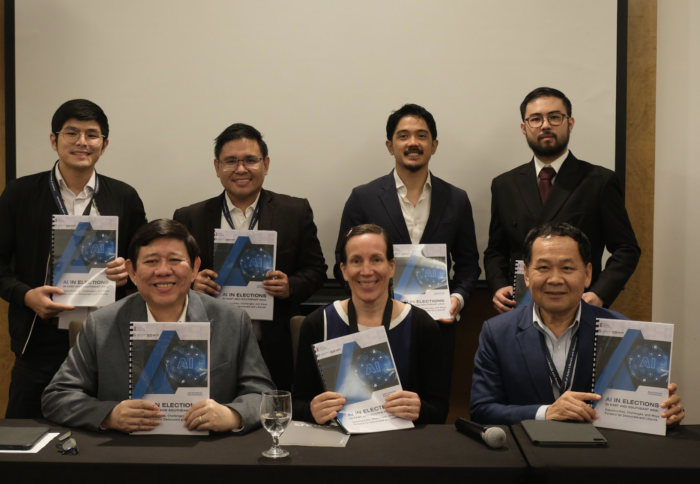 From left to right: (top) CALD Youth chairperson Jeremiah Tomas, CALD Executive Director Celito Arlegue, School of Social Justice Founding Director Alvin Carpio, and WR Numero President and CEO Cleve V. Arguelles; (bottom) Professor Dr. Julio Teehankee, Friedrich Naumann Foundation Philippine Office Country Director Dr. Almut Besold; and CALD chairperson Mardi Seng.
The Council of Asian Liberals and Democrats (CALD), in partnership with polling and research firm WR Numero, released its latest policy paper on artificial intelligence (AI) and elections on Wednesday, Dec. 4. The paper examines AI’s role in transforming political processes in East and Southeast Asia, and raises concerns over its impact on electoral integrity and democracy. WR Numero CEO and President Cleve V. Arguelles presented the findings of the study. “AI is revolutionizing elections and politics in East and Southeast Asia. It’s not just changing how campaigns operate, but is reshaping the entire electoral process. With these new opportunities come significant challenges we need to address,” Arguelles said. The report, titled Artificial Intelligence in Elections and Politics in East and Southeast Asia: Opportunities, Risks, and Ways Forward for Democrats and Liberals, identifies AI’s potential use in voter engagement, voter data analysis, party mobilization and election administration, but also warns of risks such as bias, misinformation, digital divide and cybersecurity threats.
Drawing on election experiences in Indonesia, South Korea, and Taiwan, the study notes that AI has been used for efficient conduct of elections and creative voter engagements in these countries. However, it has also been employed in widespread misinformation campaigns, particularly through deepfakes, which has eroded public trust in political candidates and the electoral process at large.
The policy paper pushes for the development of comprehensive legal and policy frameworks, adoption of internal organizational guidelines, collaboration between tech developers and independent auditors, and the emphasis on AI explainability and sovereignty.
Dr. Julio Teehankee of the De La Salle University Manila and Alvin Carpio of the School of Social Justice also provided insights and recommendations on AI use during elections.
“The intersection of AI and politics offers a promising avenue to rejuvenate democratic processes through innovation and enhanced engagement,” said Dr. Teehankee. “However, these advancements must not compromise the core tenets of democracy.”
“When thinking about policy—as policymakers, as politicians and as people going out there—we need to think of the human side of artificial intelligence,” said Carpio, emphasizing how there are workers behind these tech infrastructures.
Politicians, academics, journalists, civil society members, and CALD representatives from across the region attended the report launch.
Former Senator Leila de Lima, a party-list candidate from Mamamayang Liberal, highlighted how the policy paper can help candidates like her navigate the country’s evolving digital and political landscape. “Fake news and deepfakes are beginning to hurt us. I think it will get worse come elections, so we need to be enlightened about the dangers and how it is being propagated,” de Lima explained.
CALD Chair and Cambodian Senator, Hon. Mardi Seng, remarked on the risks and opportunities that AI provides, “But as liberals and democrats, we are strong believers in the power of technology to positively transform societies.” He added, “The possibilities are limitless, and if we are not fast enough in adopting AI technologies, we will be left behind. Technology waits for no one.”
The Philippines will hold its 2025 midterm elections on May 12, with the campaign period beginning Feb. 11 for national positions and March 28 for local positions.
You may access the complete policy paper here. High resolution photos are available for download at tinyurl.com/3a9sujzh. |
Categorised in: News Article
This post was written by CALD
 Unit 409, 4/F La Fuerza Plaza 2, 2241 Don Chino Roces Ave. corner Sabio St., 1231 Makati City, Philippines
Unit 409, 4/F La Fuerza Plaza 2, 2241 Don Chino Roces Ave. corner Sabio St., 1231 Makati City, Philippines
 +632 8819 60 71
+632 8819 60 71
 info@cald.org
info@cald.org